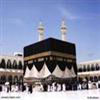Hazrat Khadija's (SA) Life and Character

- Publication date: 2014-03-17 22:09:53
- Number of views: 574
Hazrat Khadija (SA) daughter of Khuylaid and Fatima was born in Mecca in 555 CE and was a pious and worthy lady, who at the time of the pagan regime of the Arabs before Islam was well-known as "Tahireh" (Pure and Chaste Woman). She was well-known as a great and distinguished wealthy lady in the Arabian Peninsula. She engaged herself in business by the assistance of others, who traded in partnership on her behalf.1 Therefore, she was looking for a trustworthy and honest man on whom she could rely completely with her capital for business.
When Hazrat Khadija (SA) became interested in Prophet Muhammad (SAW), he was 25-years-old and already quite well-known for his integrity and honesty besides his outstanding quality as an exceptionally trustworthy man. Hence she made a proposal to him through his uncle Abu Talib. In her proposal she offered him the management of her business.2
Hazrat Khadija (SA) was well-aware of the glad tidings of the eminent coming of the Seal of the Prophets (SAW) through learned-men and spiritual leaders among them her uncle Varaqat ibn Nofal, who was considered as a prominent Arab scientist. Later her interest changed to enthusiasm upon learning that the awaited Prophet would arise to his Prophetic Mission from the City of Mecca and would marry a noble and wealthy lady of Quraysh. Her eagerness to learn more about him was heightened when Varaqat ibn Nofal gave her the good tidings that she was the chosen woman to have the honor of marriage to the Holy Prophet (SAW).3
Hazrat Khadija (SA) encouraged by the positive response of Muhammad (SAW) to her offer in accepting the responsibility to lead her business caravan, appointed Moyaser, her slave as agent to observe Muhammad's (SAW) manner and conduct during the journey and to report his observations to her. When the caravan returned from Damascus to Mecca, Khadija (SA) went to an upper-room, to be in a position to watch over the goods and their supervision. Then a stunning event held her attention and filled her with a deep sense of faith, she noticed that a cloud shaded Muhammad (SAW) and followed his steps and moved in accordance with his movements. Her interest became so intense that she proposed to him and said: "In case you desire to engage in marriage, I am ready and willing to be your wife and slave." The news of this proposal reached Abu Talib and the rest of the uncles. Abu Talib in an eloquent fashion executed the marriage contract, while Khadija's (SA) dowry came from her own wealth.
As soon as the formal proposition ceremonies and marriage were performed, the lower-class and ignorant women of Mecca who knew Khadija's (SA) wealth and prominent suitors for marriage, criticized her harshly for accepting and marrying Muhammad (SAW), who was an orphan of Abdullah, indigent of Banu Hashim and who was not of her standing.
Khadijah married the Holy Prophet of Islam, Hazrat Muhammad (PBUH) when she was 40 and he was 25 in 595 CE. They had six children: two sons and four daughters.
"When none believed me, Khadijah did. She made me a partner in her wealth." Those are the words of our Prophet Muhammad (PBUH) about his wife.
Khadijah lived with the prophet for 25 years and was his only wife during that time. When the revelations came from Allah and Muhammad (PBUH) was made the last prophet in 610 CE, it was Khadijah who accepted the faith and became the first Muslim. She was 55 years old at that time. Her acceptance of Islam greatly helped the spread of the religion among the Mecca residents.
She stood by the prophet all the time. In moments of trial and difficulty, the prophet used to come to her and she consoled and comforted her husband and encouraged him. Khadijah's wealth was used for the cause of Islam.
The prophet and Khadijah had to bear the death of their sons Qasim and Abdullah in their infancy and in the fifth year of prophethood, their daughter Ruqaiyyah left them and migrated to Abyssinia (Ethiopia) with her husband.
The Quraysh did all they could to stop Muhammad's (PBUH) propagation of Islam. Hazrat Khadijah was his source of encouragement and comfort. She also had to bear enormous strain and suffering during the boycott at Sha'bi (the valley of) Abu Talib for three years.
The great Muslim lady passed away on Ramadan 10th in the tenth year of Hijrah (prophethood), 620 CE, at the age of 65. Her death was a great loss to the prophet. He loved Khadijah so dearly that after her death, he used to remember her often.
